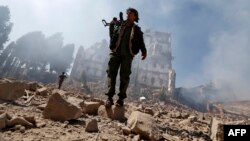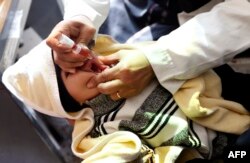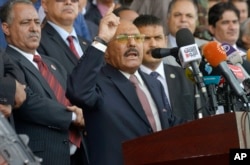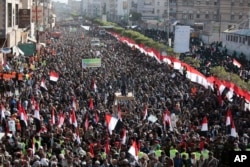As the killing of the deposed Yemeni President Ali Abdullah Saleh broadens the political fracturing in Yemen and the humanitarian crisis worsens, experts warn the war-torn country could soon become a hotbed for jihadists affiliated with al-Qaida and the Islamic State terrorist groups.
The unrest in Yemen has been ongoing since 2015 between the supporters of the internationally recognized government of President Abdrabbuh Mansour Hadi and the Houthi rebels.
With a Saudi-led Arab coalition backing President Hadi, and Iran supporting the Houthi rebels, the brutal conflict has stood at a stalemate, leaving thousands killed and injured, and leading to a humanitarian crisis that the United Nations has called the world’s worst.
As of March, an estimated 17 million Yemenis, which comprise about 60 percent of the population, are estimated to suffer from food insecurity. Another 7 million are suffering from severe food insecurity, according to data from the World Bank.
Meanwhile, the al-Qaida branch in Yemen, more commonly known as al-Qaida in the Arabian Peninsula (AQAP), and its rival, IS, have exploited the turmoil to establish safe havens in the South and carry out deadly attacks throughout the country.
Experts say the government of Hadi, with direct international support, has largely been able to keep AQAP under check in the country by evicting it from large swaths of territory and preventing it the abundant resources it once obtained from the southern oil infrastructure and ports.
However, they warn the current escalation of conflict in the country, fueled by the killing of former dictator Ali Abdullah Saleh, could provide yet another opportunity for the group to re-emerge.
"Al-Qaida and the Islamic State in Yemen are exploiting every opportunity they have to grow in strength and the ability to be able to conduct attacks both in Yemen and against external targets," Stephen A. Seche, the former U.S. ambassador to Yemen, told VOA.
"This may lead to more opportunities for them to develop recruitment to bring more fighters into their ranks," he added.
Saleh, 75, was killed by Houthi rebels just outside the capital of Sana'a last week, three days after he broke his alliance with the rebels and called for a "new page" in relations with the Saudi-led coalition.
Graphic videos and photos of the killing later surfaced online allegedly showing his corpse being paraded around on the back of a pickup truck as the rebels chanted anti-Western and ant-Saudi slogans.
The killing prompted a call from Hadi urging Yemenis to rise up against the Houthi rebels. It also led to an intense bombing campaign by the Saudi-led coalition on the rebels.
Revenge
Ambassador Seche maintains that Saleh’s death will likely widen the divide in the country as his loyalists and tribal members attempt to take revenge. It will also shift the balance of power in Sana'a by giving Houthis the opportunity to exert control over the population and the Sunni groups.
The Houthi movement consists mostly of the Shi'ite sect known as the Zaidis that account for nearly 35 percent of Yemen’s nearly 30 million population.
The group has been apparently motivated by concerns that it was marginalized by the majority Sunni sect throughout the 33 years of Saleh’s reign even though Saleh himself was a Zaidi.
With the wide support of Iran, the group has been able to successfully push back the loyalists of President Hadi in key strategic areas of the north, including the capital Sana'a.
"Certainly this is an issue that al-Qaida and other terrorist groups do play on especially in their recruitment efforts," Seche said "This is a pretty easy argument to make by some of the radical Sunnis who see the Houthis as Shiite Iranian agents."
Breeding ground
Counterterrorism officials have already warned that signs of AQAP recovery and emergence of IS in the country have started to appear.
Mark Mitchell, the Acting U.S. Assistant Secretary of Defense told U.S. Congress last week that IS militants regard Yemen as their top breeding ground after being expelled from Iraq and Syria.
"The areas that we've seen that are the most troubling and provide the most potential for [IS] in particular to establish a new base -- first of all would be Yemen, which….has a failed government and is wracked by a civil war," Mitchell told U.S Senate Homeland Security Committee during a hearing last week.
"Even when it was not at civil war, there was extensive conflict within the society and support for al-Qaida. And now we've seen some support for the Islamic State there….in Yemen" Mitchell added.
Regional rivalry
Experts charge the lingering conflict in the country indicates that the likelihood of Yemen transitioning towards a peaceful resolution seems as far away as ever with local factions, supported by regional powers, continuing to compete for influence and extremist groups exploiting the lack of governance in certain parts of the country.
"What we are going see is a continuing conflict between Sunnis and more secular Zaidis backed the Saudi Arabia and the UAE against the more doctrinaire Houthis," Roby Barrett, an expert on Yemen at the Washington-based Middle East Institute told VOA.
Barrett said the escalation of the conflict among the warring factions and the increasing popularity of the extremists will likely result in further divisions which could blur hopes for the establishment of a functioning government in the future.
"Yemen has never been a state," he said while speaking of the country’s complex demographics and unstable government. "It’s not a state now and will never be. Yemen is about five or six distinct areas."







